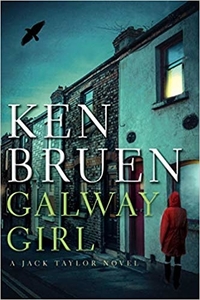The Accomplice by Joseph Kanon
 Wednesday, November 6, 2019 at 7:06AM
Wednesday, November 6, 2019 at 7:06AM 
Published by Atria Books on November 5, 2019
The first two-thirds of The Accomplice seems like a well-written story with a mediocre plot. Then the plot takes off, producing the kind of tension and moral quandaries that are the strength of spy fiction.
The novel is set in 1962. Aaron Wiley is an American. His uncle is Max Weill. Max is an Auschwitz survivor. He lives in Hamburg, a location he uses as a base for tracking down Nazi war criminals. Max wants Aaron to take over the cause, but Aaron professes to be content with his work in America as an intelligence analyst.
While Max is pleading his case to Aaron in Hamburg, Max thinks he sees Otto Schramm and promptly has a heart attack. But everyone knows that Schramm died in Argentina. Maybe Max is getting old. And he doesn’t claim to recognize the face. It is the way the man was walking that convinced Max he was looking at Schramm. Max was a young doctor during the war. Schramm let him live, but Max will never forget the things that Schramm made him do at Auschwitz. He is confident that he will never forget Schramm's swagger.
Schramm’s body was identified by a person and by dental records, but all of that might have been faked. Perhaps Schramm felt the need to disappear (again) after Israeli agents kidnapped Eichmann from a street in Buenos Aires. But why would he risk a return to Hamburg? With the help of one of Max’s friends, Aaron discovers a possible answer.
The story takes Aaron to Buenos Aires, where Schramm’s daughter lives. Predictably, Aaron finds himself in a steamy relationship with the daughter, because the protagonist’s inability to keep it in his pants is nearly inevitable in a spy novel. He also meets anti-Semitic priests and diplomats who are well positioned in Argentina, the kind of people who might help Schramm begin his third life.
The plot seems like a mundane Nazi-hunter story until it takes an unexpected twist. At that point, Aaron must confront difficult moral questions. If Schramm is indeed hiding in Argentina, what should be done about it? Israel kidnapped Eichmann so that he could be tried and executed. Is it justifiable to violate international law and national sovereignty to capture a war criminal? If Schramm cannot be kidnapped and spirited out of Argentina for a trial (a second offense that might not reflect well on Israel), is it morally acceptable to kill him? Is murder justice or vengeance? Does the fact that Schramm is a Nazi war criminal make a difference in how that question is answered? Does it matter that some of the people who directed Schramm's actions are still in Germany and are to powerful ever to answer for their crimes?
One of the characters asks whether a trial would make Israel any safer than a publicized killing. Another suggests that without a trial, the only definition of justice is: “Who has the gun?” On the other hand, is there a moral distinction between a trial with a preordained outcome and a murder? Perhaps a trial in Germany rather than Israel might be perceived as more just (Schramm, after all, committed no crime in Israel), although the judicial bias in Germany might simply run in a different direction.
Does it matter that any action taken against Schramm will have a profound effect on his innocent daughter? Eichmann was displayed in a glass cage during his trial, a humiliation that Schramm’s daughter would feel deeply if Schramm meets the same fate.
And what if some other use might be made of Schramm? The US has a history of cozying up with notorious killers, including Klaus Barbie, if it serves someone’s concept of national security. Does justice always require death or imprisonment, or might it be better to find a use for a war criminal?
Joseph Kanon gives the reader a good bit to think about while telling a story that, by the end, has enough action and suspense to entertain readers who don’t care about the questions it inspires. Because Aaron struggles to do what he deems morally right, even if it means defying his employer, he is the kind of principled character who is easy to like — whether or not the reader agrees with his moral choices. The winning combination of action, characterization, and close examination of moral issues makes The Accomplice one of the year’s smartest thrillers.
RECOMMENDED



